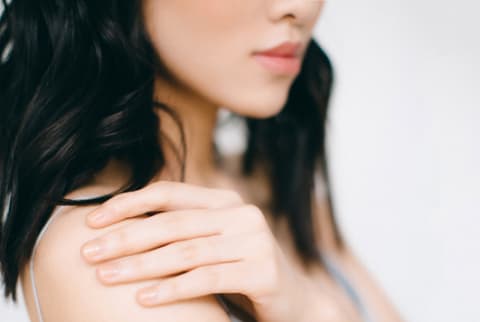Is K-Beauty Skin-Brightening Ingredient Niacinamide Actually Good For You?


It's hard not to love K-beauty. With whimsical products (panda sheet masks, anyone?), brightly colored packaging, unconventional and rare ingredients like pearl, snail mucus, and gold—let's not overlook the accessibility of single-serve products and lower price points—it's no wonder Korean beauty has struck a chord with the masses.
If you're looking to try K-beauty, find a green product that contains skin-brightening ingredient niacinamide—it sounds like a chemical, but it's simply a topical (and ingestible) B3 vitamin.
Advertisement
According to the EWG (Environmental Working Group), the leading resource that allows consumers to check cosmetics ingredients for toxicity, Niacinamide scores a "one." This is the best score it can get. A "one" indicates that it's not likely to cause cancer, disrupt your endocrine system, or instigate an allergic reaction. Niacinamide is also allowed in European cosmetics, which is a hearty stamp of approval because the beauty industry is regulated.
"Niacinamide is a very popular ingredient in many Korean skin-care products because of the multi-benefits it provides," said Alicia Yoon, licensed esthetician and founder of K-beauty mecca Peach & Lily. "It helps brighten skin and even skin tone, it helps to refine skin texture, and also has anti-inflammatory benefits. With a big focus on environmental pollutants also harming our skin, niacinamide has become even more popular for the way it can help fight the effects of pollutants on skin."
Are there any downsides to using niacinamide?
One thing to note: There have been concerns about whether it's safe to use ascorbic acid (aka vitamin C) and niacinamide together. But rest assured, derms think it's not only OK but beneficial.
"Niacinamide and ascorbic acid on their own are great skin-care ingredients," said Dendy Engelman, M.D., Director, Medical Dermatology & Cosmetic Surgery Centers of New York. "Ascorbic acid is not only a good water-soluble antioxidant but may also increase production of collagen in the skin, which can help mitigate some of the damaging effects caused by UV exposure. Niacinamide is a good anti-inflammatory, which makes it useful for treating inflammatory conditions like acne and has been shown to increase naturally occurring moisturizers in the skin."
Plus, niacinamide will banish your sunspots. "They're both very effective at reducing hyperpigmentation of the skin—it’s easy to see why people would want to use the two of them together."
There are some green beauty pioneers who are including this brightening ingredient in their skin-care lines. We recommend Marie Veronique's Soothing B3 Serum, NUGG anti-aging face mask, and Pai Copiaba and Zinc Perfect Balance Blemish Serum.
Shine bright, you beautiful green diamonds.
Want to maximize your skin's glow? Eat these nutritionist-approved foods. Plus, a hormone doctor shares what nutrients she recommends to her patients who want to improve their skin.
Advertisement

Lindsay Kellner is a freelance writer, editor and content strategist based out of Brooklyn, NY. She received her bachelor’s degree in journalism and psychology at New York University and earned a 200-hour yoga certification from Sky Ting. She is the co-author of “The Spirit Almanac: A Modern Guide to Ancient Self Care,” along with mbg’s Sustainability Editor, Emma Loewe.